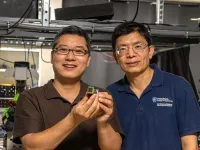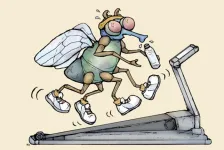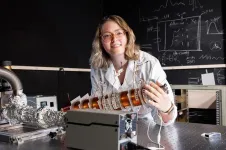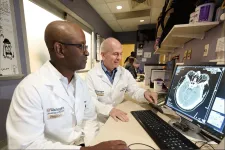(Press-News.org) As genetic sequencing technology becomes more accessible and efficient, researchers have made significant strides in understanding the genetic underpinnings of various diseases. This knowledge has led to a surge in clinical applications of genetic testing, offering hope and improved outcomes for individuals affected by many genetic diseases and disorders. Despite these successes, scientists continue to try to improve genetic testing technologies, because many individuals with rare diseases remain undiagnosed even after current state-of-the-art genomic testing.
Scientists at the HudsonAlpha Institute for Biotechnology were awarded a five-year, $2.9 million National Institutes of Health (NIH) grant to use a newer sequencing tool called long-read genome sequencing to re-sequence hundreds of genomes from individuals who previously had genome sequencing with no diagnostic results. Long-read sequencing technology provides a more comprehensive view of the genome, allowing scientists to identify many genetic variants that may be missed by traditional sequencing methods.
HudsonAlpha Faculty Investigator Greg Cooper, PhD, and his lab are at the forefront of using genome sequencing to revolutionize the diagnosis of genetic disorders in children. Since 2013, Cooper and his lab have sequenced the genomes of nearly 2,000 children, and over 40 percent of these had a genetic finding that may be relevant to their symptoms.
Now, they want to focus on long-read sequencing technology, which they think will afford even more children and families a diagnosis. Early studies show that long-read sequencing can uncover relevant genetic findings in 5-10 percent of previously tested but still undiagnosed children, suggesting its potential to significantly improve diagnostic rates for a wide range of pediatric diseases. Also, as the technology is relatively young, it can be improved and refined and has the potential to increase diagnostic success even beyond what early studies are showing.
“Long-read sequencing holds immense promise for uncovering the genetic causes of diseases,” says Dr. Cooper. “My team and I are passionate about making a difference in the lives of individuals and families affected by rare genetic disorders. By pushing the boundaries of genetic research, we hope to shed light on previously hidden genetic variation and provide more accurate and timely diagnoses. Our goal is to empower families with the knowledge they need to navigate their health challenges and build a better future.”
Dr. Cooper and his team will use long-read sequencing to re-analyze the genomes of more than 500 individuals whose short-read sequencing had previously yielded no results. They will also, in some cases, sequence the genomes of the individuals’ parents, which helps the team identify shared or brand-new variations between the children and their parents.
Long-read sequencing allows researchers to see types of genetic variation they wouldn’t see with short-read sequencing. One type of variation that shows great promise in diagnosing rare diseases is structural variants. These include large deletions, duplications, inversions, translocations, and more complex events that can disrupt gene function, resulting in diseases. Short-read sequencing has a limited ability to detect structural variants. Dr. Cooper and his team feel confident that they will identify more structural variants with long-read sequencing that might be responsible for some individuals’ symptoms.
HudsonAlpha Faculty Investigators Jane Grimwood, PhD, and Jeremy Schmutz will join Dr. Cooper in this project. For nearly two decades, they’ve co-directed the HudsonAlpha Genome Sequencing Center (GSC; formerly the Stanford Human Genome Center). The GSC team are experts at sequencing and assembling complex genomes. In fact, the GSC was one of the first labs in the world to have access to the sequencing technology being used for this proposal, continuing their long tradition of using cutting-edge genomic technologies. They will perform long-read sequencing on the samples and send them to Cooper’s lab, which will analyze the resulting data to identify any potentially medically relevant findings.
END
HudsonAlpha researchers awarded NIH grant to identify genetic contributors to rare diseases in children
Greg Cooper, Jane Grimwood, and Jeremy Schmutz awarded a 5-year, $2.9 million grant from the National Institutes of Health
2024-09-05
ELSE PRESS RELEASES FROM THIS DATE:
The signals in your brain that tell you when It’s time to move
2024-09-05
A new study, published in Nature Communications this week, led by Jake Gavenas PhD, while he was a PhD student at the Brain Institute at Chapman University, and co-authored by two faculty members of the Brain Institute, Uri Maoz and Aaron Schurger, examines how the brain initiates spontaneous actions. In addition to demonstrating how spontaneous action emerges without environmental input, this study has implications for the origins of slow ramping of neural activity before movement onset—a commonly-observed but poorly understood ...
Hudson River Foundation awards $1.7 million to Cary Institute for river monitoring program
2024-09-04
(Millbrook, NY) The Hudson River Foundation for Science and Environmental Research (HRF) has awarded $1.7 million to Cary Institute of Ecosystem Studies to monitor the Hudson River’s lower food web for three years. The project is an integral component of the $6.5 million Hudson River Ecosystem Monitoring Program, a collaboration of HRF and New York State Department of Environmental Conservation (DEC) to develop and implement the next generation comprehensive ecosystem monitoring program on the Hudson.
Cary’s Chris Solomon will lead the Interim Lower Food Web Survey to provide ...
$7.5 million grant to guard against AI-driven misinformation
2024-09-04
BLOOMINGTON, Ind. — Indiana University researchers will lead a multi-institutional team of experts in areas such as informatics, psychology, communications and folklore to assess the role that artificial intelligence may play in strengthening the influence of online communications — including misinformation and radicalizing messages — under a $7.5 million grant from the U.S. Department of Defense.
The project is one of 30 recently funded by the department’s Multidisciplinary University ...
Seeing like a butterfly: Optical invention enhances camera capabilities
2024-09-04
UNIVERSITY PARK, Pa. — Butterflies can see more of the world than humans, including more colors and the field oscillation direction, or polarization, of light. This special ability enables them to navigate with precision, forage for food and communicate with one another. Other species, like the mantis shrimp, can sense an even wider spectrum of light, as well as the circular polarization, or spinning states, of light waves. They use this capability to signal a “love code,” which helps them find and be discovered by mates.
Inspired ...
Miniature treadmills accelerate studies of insects walking
2024-09-04
Fruit flies walking on miniature treadmills are helping scientists learn how the nervous system enables animals to move in an unpredictable and complex world.
Insights from using these fruit fly-sized treadmills were reported Aug. 30 in Current Biology, a Cell Press journal. Several videos of the flies running on the treadmills are available for viewing on the online research paper. The lead author is Brandon G. Pratt, a recent physiology and biophysics Ph.D. graduate of the University of Washington School of Medicine in Seattle and a National Science Foundation ...
UTA undergraduate researcher receives national honors
2024-09-04
A physics student at The University of Texas at Arlington studying ways to measure the mass of tiny particles called neutrinos has earned a prestigious national award for her research.
Senior Kara Stogsdill received the Outstanding Undergraduate Research Award from the Society of Physics Students, an organization of the American Institute of Physics. The award is given to students based on exceptional research achievements in any physics-related field.
Stogsdill’s research is part of the Project 8 Neutrino Mass Experiment, which includes faculty and students from UTA and 13 other universities and national laboratories ...
Pennington Biomedical's Greaux Healthy Initiative takes aim at childhood obesity
2024-09-04
Pennington Biomedical Research Center is formally launching Greaux Healthy, a public service initiative designed to help improve kids’ health at every age. Developed with funding from the State of Louisiana, Greaux Healthy implements 35 years of Pennington Biomedical research and discoveries to inform tools, resources and programing for children, parents, physicians and educators throughout the state.
The Greaux Healthy initiative is developing a wide variety of educational materials distinctly tailored to four priority populations, including expectant families and parents of infants, ...
Millions of people with diabetic foot ulcers could benefit from new research discovery
2024-09-04
Highlights:
Researchers from Michigan State University and South Shore Hospital in Massachusetts have uncovered a connection between two common diabetes drugs — insulin and metformin — identified in wound exudates of diabetic foot ulcers, which may improve their healing.
While analyzing wound exudate (the fluid the body moves and secretes to the site of an injury), researchers discovered the presence of metformin in patients who take the drug orally.
The researchers then explored metformin’s relationship ...
Adding anti-clotting drugs to stroke care ineffective, clinical trial finds
2024-09-04
Stroke patients who survive a blood clot in the brain’s blood vessels are prone to developing new blockages during their recovery periods, even if they receive vessel-clearing interventions. In an effort to avoid further clots, doctors at 57 sites around the U.S. tested a possible solution: the addition of anti-coagulant drugs to medicine that dissolves blood clots.
But results from the clinical trial, led by Opeolu Adeoye, MD, head of the Department of Emergency Medicine at Washington University School of Medicine in St. Louis, indicate two such drugs did not improve outcomes.
The findings are available Sept. 4 in The New England Journal ...
Research Center awarded $14.4 million to advance new manufacturing solutions for microelectronics
2024-09-04
A new Energy Frontier Research Center (EFRC), supported by the Department of Energy’s Office of Science and led by SLAC National Accelerator Laboratory, was awarded $14.4 million over four years to advance manufacturing of microelectronics by investigating approaches to building their components in fundamentally new ways.
Instead of moving electrons through conducting metallic interconnects in the miniscule and ever shrinking parts of devices such as microchips used in computers and cell phones, the researchers propose to move information via spin waves that can propagate through semiconductors ...
LAST 30 PRESS RELEASES:
Bacteria frozen in ancient underground ice cave found to be resistant against 10 modern antibiotics
Rhododendron-derived drugs now made by bacteria
Admissions for child maltreatment decreased during first phase of COVID-19 pandemic, but ICU admissions increased later
Power in motion: transforming energy harvesting with gyroscopes
Ketamine high NOT related to treatment success for people with alcohol problems, study finds
1 in 6 Medicare beneficiaries depend on telehealth for key medical care
Maps can encourage home radon testing in the right settings
Exploring the link between hearing loss and cognitive decline
Machine learning tool can predict serious transplant complications months earlier
Prevalence of over-the-counter and prescription medication use in the US
US child mental health care need, unmet needs, and difficulty accessing services
Incidental rotator cuff abnormalities on magnetic resonance imaging
Sensing local fibers in pancreatic tumors, cancer cells ‘choose’ to either grow or tolerate treatment
Barriers to mental health care leave many children behind, new data cautions
Cancer and inflammation: immunologic interplay, translational advances, and clinical strategies
Bioactive polyphenolic compounds and in vitro anti-degenerative property-based pharmacological propensities of some promising germplasms of Amaranthus hypochondriacus L.
AI-powered companionship: PolyU interfaculty scholar harnesses music and empathetic speech in robots to combat loneliness
Antarctica sits above Earth’s strongest “gravity hole.” Now we know how it got that way
Haircare products made with botanicals protects strands, adds shine
Enhanced pulmonary nodule detection and classification using artificial intelligence on LIDC-IDRI data
Using NBA, study finds that pay differences among top performers can erode cooperation
Korea University, Stanford University, and IESGA launch Water Sustainability Index to combat ESG greenwashing
Molecular glue discovery: large scale instead of lucky strike
Insulin resistance predictor highlights cancer connection
Explaining next-generation solar cells
Slippery ions create a smoother path to blue energy
Magnetic resonance imaging opens the door to better treatments for underdiagnosed atypical Parkinsonisms
National poll finds gaps in community preparedness for teen cardiac emergencies
One strategy to block both drug-resistant bacteria and influenza: new broad-spectrum infection prevention approach validated
Survey: 3 in 4 skip physical therapy homework, stunting progress
[Press-News.org] HudsonAlpha researchers awarded NIH grant to identify genetic contributors to rare diseases in childrenGreg Cooper, Jane Grimwood, and Jeremy Schmutz awarded a 5-year, $2.9 million grant from the National Institutes of Health







